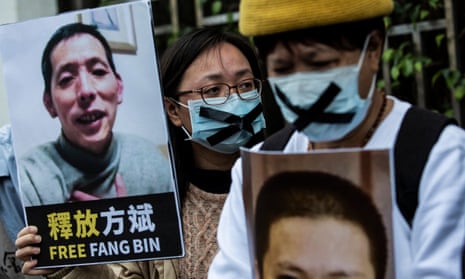A Chinese citizen journalist who disappeared three years ago while reporting on the Wuhan coronavirus lockdown – and was later revealed to have been detained by authorities – has reportedly been released.
Fang Bin was let out of detention on Sunday, according to multiple media reports that cited people close to the family. The reports said he had gone to Beijing, where some of his family live, before being sent back to Wuhan on Monday morning, where he remains under strict supervision.
A Chinese human rights monitoring group said neither Beijing nor Wuhan authorities wanted responsibility for Fang, and were pushing him between the two cities.
Fang was among a number of Chinese people who were targeted by authorities for publicly reporting the events of the world’s first major Covid-19 outbreak and lockdown. He and fellow citizen journalist Chen Qiushi, disappeared from Wuhan in February 2020.
Chen resurfaced in September 2021 in a video broadcast live on his friend’s YouTube feed, saying he had suffered from depression. He did not provide details about his disappearance.
Fang’s disappearance was shrouded in confusion and secrecy, with conflicting reports about whether he was in detention, living with his parents under supervision, or under surveillance at a designated location – a form of secretive Chinese detention that allows authorities to hold a person for six months without charge. Several reports have said his family feared speaking out about the case.
On Sunday, the Associated Press quoted a source who claimed Fang had been sentenced to three years in prison for “picking quarrels and provoking trouble”, a vague charge traditionally used against political dissidents. Radio Free Asia added that he served his sentence at a correctional centre in Wuhan’s Jiangxia district.
In December 2020, former lawyer turned journalist Zhang Zhan was sentenced to four years in prison on the same charge, for her reporting in Wuhan. Zhang began a hunger strike shortly after her arrest and supporters have repeatedly expressed serious concern for her health.
In 2021 Zhang’s former lawyer told the Guardian that her sentence was “a warning” from the Chinese government, and suggested she was being severely treated in retaliation for her actions.
China’s government has consistently been accused of a lack of transparency since Covid-19 was first detected. Wuhan, home to 11 million people, was the first of many cities around the world to go into a strict city-wide lockdown.
Traditional and citizen journalists sought to publicise the disastrous outbreak, which overwhelmed hospitals and other services, but authorities sought to strictly control the flow of information, hindering reporting and arresting journalists and whistleblowers.
